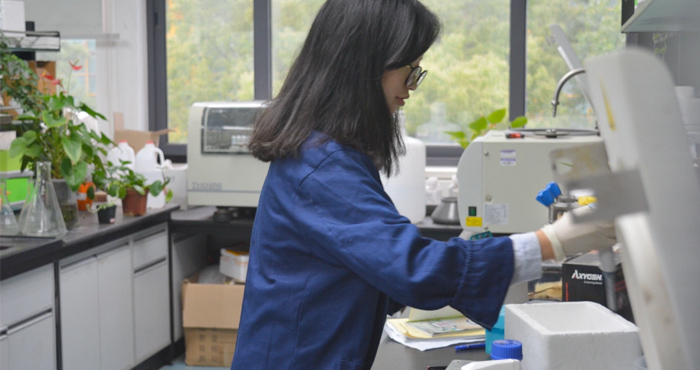K-State professor leads consortium using AI to find COVID-19 treatments
Kansas State University is leading a new research consortium that focuses on speeding up research for COVID-19 drug treatments. The consortium is making all its findings freely available to researchers worldwide.
Ho-Leung Ng, K-State associate professor of biochemistry and molecular biophysics, is the founder of the Open Source COVID-19, or OSC19, research consortium that is using computational chemistry to minimize the traditional, slow research lab work for COVID-19 drug treatments. Along with K-State, main host universities include the Wistar Institute in Philadelphia and the University of Toronto in Canada. Intel is the research sponsor.
Until a vaccine for COVID-19 is proven both safe and broadly effective, Ng said pharmaceutical treatments are urgently needed now.
A focus of OSC19 is Mpro protease, an enzyme that controls viral replication. Ng said researchers can stop SARS-CoV-2 — the virus that causes COVID-19 — from replicating by disrupting the function of this enzyme. The challenge is to find pharmaceuticals that can safely cause the disruption.
“We are using artificial intelligence — AI — to design covalent inhibitors for COVID-19,” Ng said. “Our efforts are based on deep learning and generative AI modeling.”
The OSC19 deep-learning research effort screens known pharmaceuticals — ones that doctors have a good handle on their safety — against the Mpro protease. Once effective drugs are found, OSC19 also screens chemically similar molecules to identify novel pharmaceuticals. With a collection of promising potential drugs, success against COVID-19 increases compared to identifying only one potential drug, Ng said.
“Our current computational and experimental results are that GC376 and boceprevir are the most promising for potential chemical optimization,” Ng said. “We are currently synthesizing and testing analogs of these two drugs against COVID-19.”
GC376 is an experimental veterinary antiviral drug previously developed by Yunjeong Kim and Kyeong-OK “KC” Chang at K-State and William Groutas at Wichita State University. It is licensed by Anivive Lifesciences. Boceprevir is an FDA-approved drug for hepatitis C.
The OSC19 generative AI modeling research effort is in its early stages. Researchers are identifying which anti-COVID-19 molecules exhibit the necessary chemical properties, such as solubility, low toxicity and drug activity. Ng said an advantage of this approach is that it helps researchers move away from conventional molecules to those that experienced professionals would not have predicted.
“Our best results are molecules that are not easily synthesized,” Ng said. “These results are still useful because a human expert can identify similar molecules that can be prepared in the laboratory.”
Potential pharmaceuticals identified by OSC19 are currently being synthesized by collaborating partners. While early results are promising, they are not yet ready for clinical testing, Ng said. Experimental validation of OSC19 compounds by enzyme assays, crystallography and antiviral activity is being led by Troy Messick at the Wistar Institute.
While the consortium is supported by Intel, philanthropic funding could help move the research forward more quickly. To learn more about the consortium, visit their website.
By Michael Scott Long





